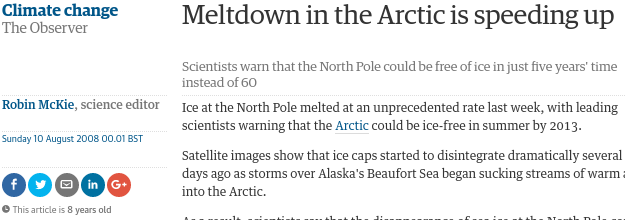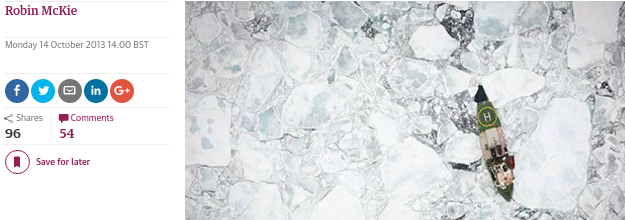Two posts ago, on the subject of another claim of an ice-free Arctic published in the Guardian, the discussion arose whether the journalist realized that he quoted someone with a poor track record in that matter. Commenter Chrism56 alerted me that the journalist (Robin McKie) already had written articles in the past on this subject, so he should have known that there were issues with the credibility of this claim.
The link that was provided went to an article from 2008 in which McKie reported about the claim of an ice-free Arctic that back then was expected five years further in the future.

The claim was made by Serreze, Maslowski and Wadhams. Apparently he should know about the botched prediction in the meanwhile.
I became curious whether there were more articles written by McKie on this topic and also how he wrote about it in say 2013, when it became clear that the 2008 claim didn’t hold. I found three articles in the Guardian about an ice-free Arctic and the article in 2016 was the fourth. When reading them in the sequence as these were written, it developed in something rather funny.
Let’s start with the link found by Chrism56. It was an article from August 2008 with the title “Meltdown in the Arctic is speeding up”. This speeding up was explained as (my emphasis):
The most important of these computer studies of ice cover was carried out a few months ago by Professor Wieslaw Maslowski of the Naval Postgraduate School in Monterey, California. Using US navy supercomputers, his team produced a forecast which indicated that by 2013 there will be no ice in the Arctic – other than a few outcrops on islands near Greenland and Canada – between mid-July and mid-September.
‘It does not really matter whether 2007 or 2008 is the worst year on record for Arctic ice,’ Maslowski said. ‘The crucial point is that ice is clearly not building up enough over winter to restore cover and that when you combine current estimates of ice thickness with the extent of the ice cap, you get a very clear indication that the Arctic is going to be ice-free in summer in five years. And when that happens, there will be consequences.’
This point was backed by Serreze. ‘The trouble is that sea ice is now disappearing from the Arctic faster than our ability to develop new computer models and to understand what is happening there. We always knew it would be the first region on Earth to feel the impact of climate change, but not at anything like this speed. What is happening now indicates that global warming is occurring far earlier than any of us expected.’
That is quite a amusing expression: “sea ice is now disappearing from the Arctic faster than our ability to develop new computer models”…
T H A T fast…
Okay, I understand from this article that the melt went much faster than expected and that, based on this expectation, the Arctic would be ice-free in 2013.
Fast forward four years (one year from the expected date of being ice-free in 2008) and again a doom message is being broadcasted by McKie. Titled, gasp, Rate of Arctic summer sea ice loss is 50% higher than predicted.

This is how it is explained (my emphasis):
Sea ice in the Arctic is disappearing at a far greater rate than previously expected, according to data from the first purpose-built satellite launched to study the thickness of the Earth’s polar caps.
Preliminary results from the European Space Agency’s CryoSat-2 probe indicate that 900 cubic kilometres of summer sea ice has disappeared from the Arctic ocean over the past year.
This rate of loss is 50% higher than most scenarios outlined by polar scientists and suggests that global warming, triggered by rising greenhouse gas emissions, is beginning to have a major impact on the region. In a few years the Arctic ocean could be free of ice in summer, triggering a rush to exploit its fish stocks, oil, minerals and sea routes.
Four years after the 2008 article, the ice loss is reported as 50% higher than previously predicted. Yet, curiously, now it was expected that The Arctic ocean would be ice free in the next few years…
Huh!?!?
In the next few years!?!?
How could it be that the ice-free Arctic now was expected only in a few years? If it was really true that the melt in 2012 was 50% faster than expected and one expected four years ago that the ice would be gone in 2013, then the Arctic being ice-free only in 2014 or 2015 is waaaaaaaay slooooooower than expected. 2013 is what one expected in 2008, so anything beyond 2013 would be slower.
That was 2012. We know that there was a lot more ice than expected in the next year. Far from being being ice-free as predicted in 2008. In 2013 there was another article on the ice-free Arctic.

Kudos to McKie for admitting that the prediction failed miserably. But then he came with this strange twist (my emphasis):
So how long will it take until the summer ice is gone? This question was raised at a Royal Society symposium, Next Steps in Climate Science, earlier this month by Julienne Stroeve of the University of Colorado. “Many different computer models have been developed to predict when summer sea ice will disappear from the Arctic,” she said. “Fifty per cent of these models say it will have gone by 2060. However, it is worth noting that the actual rate of ice loss now seems to be running about 20 years ahead of computer models, so I would think a better date will be between 2030 and 2040.”
That does not mean that ice will disappear from the Arctic altogether. During the Arctic winter, ice cover has hardly changed in recent years, Serreze says. Nor is it likely to. “It is bitterly, bitterly cold in the Arctic winter and it would take an awful lot of the global warming to stop ice forming then. Arctic ice will be with us for hundreds and hundreds of years. It is only in summer, when temperatures hover around freezing, that the gradual warming produced by greenhouse gases can have an effect – and that is precisely what we are seeing now, albeit with an occasional blip in our graphs.”
Huh!?!?
Basically, he now said to come back in twenty to thirty years, then the ice will be probably gone…
?!?!?!??!?!?!??!?!?!?
So, in 2013 (the time that the ice didn’t melt as expected) we were told that the ice loss is running 20 year BEHIND the computer models? Remember, before 2013 the Arctic melt was first waaaaaaaaaaay BEYOND what the computer models expected and in 2013 it went to the reverse situation where ice loss is running several decades BEHIND what the computer models expect.
All that in just ONE year! That is the mother of all flip-flops.
The subtitle had an even weirder claim (my emphasis):
The summer thaw did not reach a record low this year, encouraging climate change deniers, but the outlook is unchanged, say scientists”.
Really?!?!
We were witness of an amazing flip-flop, catapulting the melt from well beyond what the models expected to decades behind what the models expected, yet the outlook is still … the same?!?!?
Now in 2016, there was again a flip-flop and that 20-30 year outlook shrunk to again one year or so.

Sigh.
All written by the same guy. Unless the science on Arctic ice-melt itself is flip-flopping from year to year, I think the writings of McKie are not exactly reliable, at least when it comes to the topic of Arctic sea ice melt.

Reblogged this on Tallbloke's Talkshop and commented:
Excellent. So climate alarmists trumpeting Arctic ice melt are prone to farcical exaggeration at least, utter rubbish at worst. Who knew?
LikeLike
Reblogged this on WeatherAction News and commented:
Do I see a squirrel? 😉
LikeLike
Reblogged this on TheFlippinTruth.
LikeLike
Good work. We need this type of exposure of warmists saying anything for the cause.
LikeLike
Mr McKie has an interesting title: Science Editor!
LikeLike
Yes, he edits science.
LikeLike
@bobfj Yes, I noticed that too. My first reaction on that was similar to the tongue-in cheek-reaction of John Silver above…
LikeLike
bob:
That means he edits science.
LikeLike
Thanks for posting more on the failed predictions. You should be now be able to understand the reasoning behind the comments I made.
If you want to have more fun, look at this letter exchange by Mr McKie.
https://www.theguardian.com/commentisfree/2010/feb/07/robin-mckie-benny-peiser-climate
where there is this highlight ” I am baffled why you should think this is the case (suffering a severe crisis in credibility)” .
and all done without a hint of irony.
LikeLike
I came across that article also. It is indeed an eye brow raiser too. At the time of reading I considered it good material for another post, but I bumped into something else in the meanwhile. It is on my list of potential posts (but that doesn’t necessarily guarantee it becoming a post).
LikeLike
Just another of those “Holy crap I’ve done a lot of digging” moments…
It should be noted that the methods used by satellites to assess ice thickness may be fooled by the earth’s normal cyclical temperature changes…not to mention sensor/orbital drifts. The composition of the ice changes slowly because of the ways in which it forms, how old it is, etc. And if you’ll check around for things like physically verified sea ice maps, you’ll find that often the satellites show open water where observers have directly observed the ice thickness.
There is also the issue of the more powerful ice breakers…like the russian, nuclear powered ice breakers…plowing through and breaking up thicker ice than ever before. I’m not saying they are or aren’t causing significant “damage” to the ice, but it’s something to consider.
LikeLike
It was surprising, but also a lot of fun to see the sequence and the abrupt changes in reporting. It looked however coherent on the condition that we didn’t remember what was predicted in the past.
I am aware that there are issues with the satellite measurements of sea-ice, but I don’t think that this was the issue in the sequence of these stories. Here the journalist just cherry-picked the stories that he wanted to hear and only changed the party line position when he found himself with his back against the wall, looking at the reality that the sea-ice was not gone as predicted and there was even more ice against than previous year, far from the 1 km3 that was predicted. Then making another u-turn later to the party-line again. This was not prompted by the issues with the measurements, but by the author wanting to sound the alarm, with the above comical sequence as a result.
LikeLike